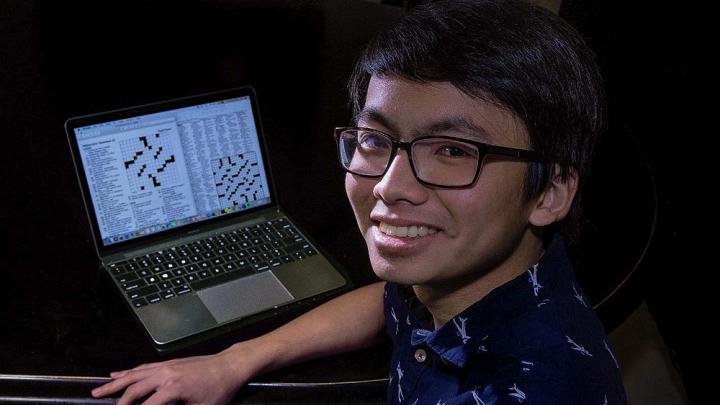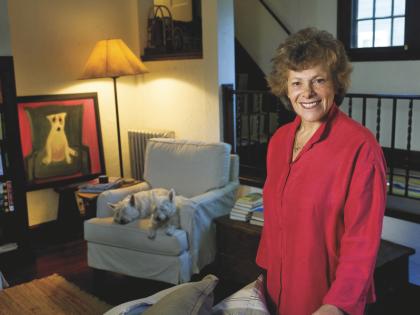Paolo Pasco ’22 was still a high-school freshman when he learned that one of his crossword puzzles had been accepted for publication by The New York Times. “I was just getting out of gym class,” he recalls, “and I saw the subject line “crossword yes” from the Times in my inbox. And then, well, I had to go to French class.”
Pasco is now halfway through his freshman year in the College and considering a concentration in computer science. He has had 12 puzzles published in the Times, and several others in The Wall Street Journal, BuzzFeed,and the crossword-specific American Values Club. He also publishes puzzles regularly on his own blog, Grids These Days.

Click on the image above to print out a copy of a special Harvard Magazine puzzle by Paolo Pasco
Click here for the solution
His fascination began early. As a child, he picked up a book of sudoku puzzles; after finishing it, he found himself working through the Dell Magazine puzzle books sold in drugstores. In eighth grade, he got a book of New York Times crossword editor Will Shortz’s favorite puzzles and solved them. Crosswords are “more than a straight-up boring trivia-recall thing that people expect,” he says. By the end of middle school, Pasco was building his own crosswords and collaborating with other members of the puzzle community through websites like Reddit, Twitter, and Cruciverb, an online forum where puzzle-lovers trade tips and collaborate. These puzzle forums “mostly flare up when the New York Times crossword comes out, and people discuss it,” he explains. “You wouldn’t think it exists until you looked into it, but these tiny subcultures have these entire threads. It’s wild.”
Online communities meet in person at events like the American Crossword Puzzle Tournament or Lollapuzzoola. At Lollapuzzoola, moderators push competitors to use the crossword format in unexpected ways; Pasco describes a challenge modeled after the game “Red Light, Green Light,” as well as crossword grids shaped like stop signs or split across two sides of a sheet of paper. Such quirkiness is what Pasco loves best about puzzle-making, and it drives his own approach: “I want to expand the audience,” he says.
A Filipino American who grew up in San Diego, he doesn’t fit the typical profile for crossword-puzzle enthusiasts: the traditional target audience is mostly older and whiter. But he and others of his generation want to diversify the puzzle world. He recalls building crosswords for BuzzFeed in 2015—“and that was great, because I could throw [Guardians of the Galaxy star] ‘Chris Pratt’ in, and no one would care.” Pasco has also worked answers like “emotional labor,” “imposter syndrome,” and “money diary” into his puzzles, building his voice as a puzzle-maker for younger readers plugged into popular culture: “I take something that’s generally seen as very stuffy, high-class, and artsy, I throw a bunch of Kardashian references and memes into it, and kind of let the culture wars happen.”
At any given time during the school year, Pasco is working on at least one puzzle. Depending on how heavy his course load feels, the process can take between one day and one week. He uses a notebook to hash out theme ideas, but also compiles word lists in the notes section on his iPhone. “It’s definitely not an intentional research process,” he explains. “A puzzle is formed from clues built up over time.” He tries to avoid using answers that are too “crosswordy,” words rarely used by people who don’t solve (and build) crossword puzzles: “épée,” which has many vowels, is a good example. Once he has developed the clues, Pasco uses an iPhone app called Crossfire that helps build grids and suggests shorter “filler words” that don’t necessarily pertain to the puzzle’s theme. At the end of the construction process, he likes to have a tester from the online community complete his crossword to make sure the difficulty level is reasonable, and the clues are solvable.
Creating clues that outlast the current moment is another challenge, at least in designing puzzles for the Times. Submissions must be made by mail, and there is a four- to six-week wait to hear back. Plus, Will Shortz prefers evergreen crosswords that won’t go stale if he decides to include them in future puzzle books. “Really early on,” Pasco says, “I sent [Shortz] one with the word ‘sharknado,’ and he rejected it because he didn’t feel like it had staying power.” Many younger puzzle-solvers, on the other hand, want their crosswords to reflect the movies, music, and news they follow, and sites like American Values Club, a reincarnation of The Onion’s now-defunct crossword feature, have cropped up to satisfy them.
That divergence hints at a larger tension in the crossword world, as a younger, more ethnically diverse indie scene emerges. “The norm” in many crosswords, Pasco says, “is lots of Lord of the Rings clues, lots of baseball clues, and lots of things that [older white men] would be expected to know. It’s really homogeneous.” He’s especially excited about organizations like The Inkubator,which publishes bimonthly crossword puzzles created by women. In more traditional crosswords, he says, “there are always these references to old opera stars or golf, and those are somehow okay, but if you include one reference to a rapper, everyone’s all up in arms.” He intends to continue to raise consciousness about different parts of culture through his own puzzles. “When you clue the same words in the same ways, it kind of reinforces what parts of culture are worth knowing about.”








